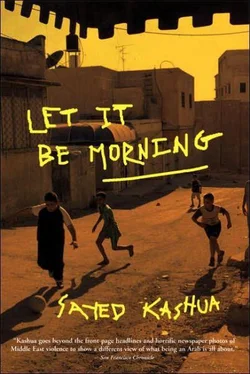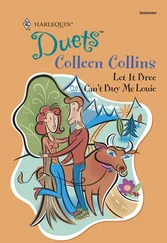Everyone was pleased to hear that Ibtissam was getting married. The women had begun calling her the Old Worm who would never find a husband, and suddenly there was her man, coming from Ramla. They were sure that once she was married she would leave the neighbors alone. I remember that I went to her wedding too. I’d never seen Ibtissam happy before, but on that day she was dancing away in her white dress, with her father in his wheelchair, and kissing everyone. That was when I realized Ibtissam was actually a nice woman.
Farres the Ramlawi seemed like a good man, and the neighborhood rejoiced. They said he wasn’t like the other strangers, he hadn’t killed anyone, or if he had, it was his brother or his cousin who’d been involved in a murder in Ramla, and that Farres himself was a good person who’d once been a successful car mechanic before the police forced them to leave their home and move to our village.
My mother said that who knows, maybe someday there would be a sulha truce between the two families and then Farres and Ibtissam would move to Ramla for good, and that it would all be for the best. How much longer did the old man have anyway? My mother always said he was counting the days.
In fact, Ibtissam never left our neighborhood. One week after her wedding she came back home with Farres, and all the neighbors stood around looking at them as they entered their home with their luggage and a few pieces of furniture. Farres kept smiling and Ibtissam seemed very happy too. Later everyone said they must have made a deal: he would marry her and she would let him live in the house with her and her father. Her father died one month after she and her husband came back home, but she went on looking happy, as if his death hadn’t really fazed her. She didn’t get rid of the wheelchair. Just left it in the yard, and every now and then she’d sit in it and chase after our soccer balls.
It wasn’t long before everyone hated the Ramlawi, and said that the old man had been an angel by comparison. My mother wouldn’t let us talk to him, even if he called us. Initially he would invite all of the neighbors’ children over to their house and he’d give us the ball and shout at Ibtissam if she tried to hold on to it. He seemed like a nice guy who liked children. Children would come to the house all the time. Some of them were older and some were in middle school, kids I knew. They would go into the house in groups of three or four, and Farres would always lock the door behind them.
My brothers and I never talked with Farres or Ibtissam. My father said he was a pervert, but we didn’t know what that meant. Farres would stay home all day and never went to work. The groups of boys who came to see him kept growing larger. Sometimes they would knock on the door and Farres would open up and ask them to wait awhile, and they’d hang out in the yard until the previous group had left and Farres would invite the new group to come inside. He was always very nice, hugging them all and smiling at them: “Ahalan u-sahalan.”
Once when we were playing soccer, Khalil told us that some of the kids in his class were going to Farres’s place very frequently, that Farres would show them sex videos and let them smoke cigarettes and drink beer. Khalil said it cost five shekels to watch a film and another five for the beer and two cigarettes.
One day, Khalil’s father, who was a teacher in the middle school, got really pissed off and started yelling at his students as they approached Farres’s home, warning them not to go inside. “I’ll tell your parents,” he yelled. “I know you. Just wait and see what I do when you get to school tomorrow.” The kids got out of there as fast as they could, and Farres kept coming out onto the balcony, smiling and taunting Khalil’s father. “You’re interfering with my work.” And Khalil’s father yelled back, “Is this what you call work? You should be ashamed of yourself.” And Farres said it was a shame that Khalil’s father didn’t show more respect to a cinema professional like himself.
In the evening, several hundred young men are recruited to get the job done as quickly as possible. All those who’d spent the morning waving green flags and red flags and Palestinian flags have volunteered to round up the illegal workers. In vans, cars and trucks, they’re doing whatever they can. The noise of the engines fills the dark village streets, with nothing showing except headlights. The operation began late at night, but still, many people are awake, peeping out of their windows, staring from their balconies, sitting in their yards and looking on. Some are even cracking sunflower seeds. The whole family has congregated in my parents’ home again. The two children — mine and my brother’s — are sleeping in my parents’ bed. My younger brother is trying to study by candlelight, straining to prepare for the exam the following morning, but finally he gives up. From time to time we hear the wail of a siren or the sound of someone screaming, probably egging the workers on. Why the hell can’t they at least go about it less callously?
The car radios in the vehicles driven by the village youth are playing loud music, and the drivers are honking rhythmically to signal they’re transporting workers. They’re rounding them all up in the yard of my wife’s school, not far from our home. Every now and then my mother, who’s feeling uncomfortable about the whole thing, curses the Jews. My wife says the villagers are behaving like animals. She says they are animals, and always have been. Why did they have to choose the most repulsive people for the job? Couldn’t they have done it quietly, by persuasion? Couldn’t they at least say they were sorry? Luckily, being Arabs, they’re not drafted into the Border Police or the army. They’d make the most brutal soldiers in the world.
My heart is beating hard, and my head is about to burst. We stay at my parents’ home until late at night. Finally the noise of the cars stops and it seems like the job has been completed. The only remaining noise is coming from the schoolyard nearby. Occasionally we hear one of the workers shout, “Haram aleikum,” but someone soon snaps at him to shut up. My father has never looked so defeated. You can see him in the candlelight, sitting in his white plastic chair with tears streaming down his face.
We leave our daughter with my parents. My wife falls asleep right away, right after her shower. I don’t have the heart to shout at her, even though it really was irresponsible of her. How the hell could she sleep so well? I try to fall asleep too but it’s no use. I pace the house for hours. From time to time I lie down on the bed, shut my eyes and then get up again, go up on the roof and look at the blue headlights of the jeeps. I light a cigarette and listen to the engines running, much louder than before. I wonder if the workers at the school have been able to sleep at all.
Three buses, belonging to the company that used to transport the workers to work and back belong to one of the richest men in the area, are lined up at the gate of the schoolyard at daybreak. I can see them from our rooftop, loading up the workers — more than one hundred in all. A few armed thugs get on each bus to keep an eye on them. I get the car and head toward the road that leads out of the village. To my surprise, thousands are waiting, dressed for work, they’re convinced that once we hand over the workers they’ll be free to leave. The mayor, the village council members and a few of the village dignitaries are standing at the exit, also waiting for the buses.
The workers get out, their heads down, and march in the direction the villagers point to. From time to time, one of them sobs and begs for pity. The mayor orders his men to line up the workers. More and more troops join the two tanks standing six hundred feet away, and the soldiers get into position and point their weapons. The mayor waves a white flag and shouts as loud as he can that they’re handing over the illegal workers. A council member takes a bullhorn, the one they used the night before to shout anti-Israel slogans, and yells out their intentions. The soldiers don’t respond. The mayor orders the workers to put their hands up and tells the first one to hold up the white flag in his right hand. Two young men place planks across the barbed wire so the workers can walk across. The first worker, tall and thin, climbs up onto the plank. He is shaking, and he starts staggering across. As he approaches the other side, he takes a bullet, lets out a half shout and drops to the ground. He’s been hit in the heart. The workers all duck, and some get down on the ground. The workers start yelling and crying, and try to escape to the rear, but they’re blocked by the villagers. The mayor shouts into the bullhorn that nobody will be allowed to leave. The workers sob and plead for their lives. I stand to the side, at a distance, bent over, breathing hard and making sure to stay out of range. I see Mohammed, the harelip. He looks the least concerned of any of them. The mayor and his aides decide to try again, apparently convincing themselves that the soldiers had only shot because they thought one of the workers was hiding explosives under his clothing. The mayor gives his orders and the sobbing workers are stripped brutally by thugs and by others who’ve always hated them. The workers who try to resist are kicked hard in the ribs. They curse the whole time, are slapped and clubbed and are made to line up again, wearing nothing but underpants.
Читать дальше












